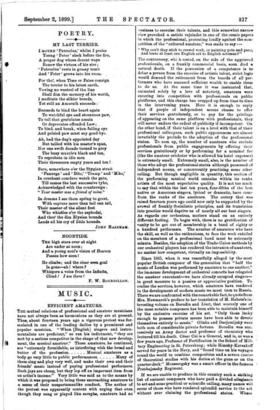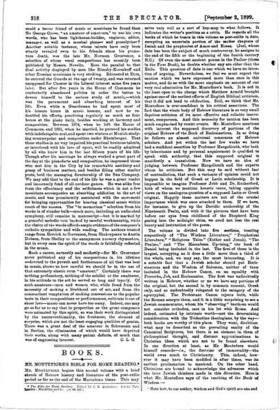MUSIC.
EFFICIENT AMATEURS.
Tiar mutual relations of professional and amateur musicians have not always been as harmonious as they are at present. Thus, about fourteen years ago a vigorous protest was for- mulated in one of the leading dailies by a prominent and popular musician. "When [English] singers and instru- mentalists are proficient," so ran his indictment, "they are met by a serious competitor in the shape of that new develop- ment, the musical amateur." These amateurs, he continued, are "extremely formidable, as interfering with the bread and
butter of the profession Musical amateurs as a body go very little to public performances Many of them sing and play very well, and make their own and their friends' music instead of paying professional performers. Such joys are cheap, but they lop off an important item from an artist's income." Very little was said as to the means by which it was proposed to bring these encroaching amateurs to a sense of their unsportsmanlike conduct. The author of the protest was apparently content with urging that even though they sang or played like seraphs, amateurs had no
curliness to exercise ,their talents, and this somewhat narrow view provoked a satiric: rejoinder in one of the.comic papers in which the professional, protesting loudly against the com- petition of the "cultured amateur," was made to say :— "Why can't they stick to crewel work, or painting pots and pane, And leave at least one English art to English artisans?'
The controversy, whi_h rested, on the side of the aggrieved professionals, on a frankly commercial basis, soon , died a natural death. If the possession of a competence is to debar a person from the exercise of artistic talent, strict logic would demand the retirement from the boards of all per- formers who have amassed sufficient wealth to enable them to do so. At the same time it was insinuated that, animated solely by a love of notoriety, amateurs were entering into competition with professionals on public platforms, and this charge has cropped up from time to time in the intervening years. Here it is enough to reply that if people of independent means choose to offer their services gratuitously, or to pay for the privilege of appearing on the same platform with professionals, they will never endure the ordeal of publicity if incompetent. On the other hand, if their talent is on a level with that of their professional colleagues, such public appearances are almost invariably the prelude to the adoption of the professional status. To sum up, the number of amateurs who exclude professionals from public engagements by offering their services gratuitously or by performing for a nominal fee (like the amateur cricketer who is allowed his hotel expenses) is extremely small. Extremely small, also, is the number of those who adopt the professional status although possessed of independent means, or concurrently practising some other calling. But though negligible in quantity, this section of the performing musical world contains within its ranks artists of the moat superlative quality. It is not too much to say that within the last ten years, four-fifths of the best native or American singers, lyrical or dramatic, have come from the ranks of the amateurs. The outcry that was raised fourteen years ago could now only be supported by the avowal of frankly Socialistic principles, and its translation into practice would deprive us of nearly all our best singers. As regards oar orchestras, matters stand on an entirely different footing. To begin with, there is no gratification of vanity to be got out of membership in a band of eighty or a hundred performers. The number of amateurs who have the skill, as well as the enthusiasm, to face the work entailed on the members of a professional band must be extremely minute. Besides, the adoption of the Trade-Union methods by our orchestral players has rendered the intrusion of amateurs, no matter how competent, virtually an impossibility.
Since 1885, when it was resentfully alleged by the most popular British composer of the generation that "half the music of London was performed by amateurs to one another," the immense development of orchestral concerts has relegated the amateur executant—we have already excepted singers— in great measure to a passive or appreciative position. To realise the services, however, which amateurs have rendered in the development of modern music we must turn to Russia. There we are confronted with the remarkable fact, to quote from Mrs. Newmarch's preface to her translation of M. Habeta's in. teresting volume on Borodin and Liszt, that scarcely one of the most notable composers has been able to maintain himself by the exclusive exercise of his art. "Only those lucky enough to possess private means have been able to devote themselves entirely to music." Glinka and Darjomijsky were both men of considerable private fortune. Borodin was suc- cessively an Army doctor and professor of chemistry who lectured till his death. User Cui is a General, and is, or was a few years ago, Professor of Fortification in the School of Mili- tary Engineering in St. Petersburg; while Rimsky-Korsakoff served for years in the Navy, and "found time on his voyages round the world to combine composition and a severe course of theoretical studies with his duties at the guns or on the quarter-deck." Moussorgsky was a smart officer in the famous Preobajensky Regiment.
If we are unable to produce in this country such a striking list of eminent composers who have paid a divided allegiance to art and some practical or scientific calling, many names will occur of those who have rendered splendid service to the art without ever claiming the professional status. Where could a better friend of music or musicians be found than Sir George Grove, "an amateur of amateurs," to use his own words, who has been lighthouse-builder, engineer, editor, manager, as well as a musical pioneer and proselytiser? Another notable instance, whose talents have only been clearly revealed even to his friends since his prema- ture death. was the late Mr. Norman Grosvenor, a selection of whose vocal compositions has recently been published by Meters. Novell°. Here the parallel to that dual activity displayed by men like Rimsky-Korsakoff and other Russian musicians is very striking. Educated at Eton, he entered the Guards at the age of twenty, and was returned unopposed for Chester in the Liberal interest some five years ]ater. But after five years in the House of Commons he contentedly abandoned politics in order the better to devote himself to the serious study of music,—which was the paramount and absorbing interest of his life. Even while a Guardsman he had spent most of his leisure hours in music lessons, and now he re- doubled his efforts, practising regularly as much as four hours at the piano daily, besides working at harmony and composition. Between 1874, when he left the House of Commons. and 1881, when he married, be pursued his studies with indefatigable zeal, and spent two winters at Munich study- ing counterpoint and composition under Rheinberger. That these studies in no way impaired his practical business talents, or interfered with his love of sport, will be readily admitted by all who knew him in the last fifteen years of his life. Though after his marriage he always worked a great part of the day at the pianoforte and composition. he impressed those who met him in the City by his remarkable assiduity and grasp of business matters, and besides filling other similar posts, held the managing directorship of the Sun Company. We may add that to the end of his life he was a great reader and immensely fond of all outdoor games. He was alike free from the effeminacy and the selfishness which in not a few musicians accompanies an absorbing addiction to the art of music, and was prominently associated with the movement for bringing opportunities for hearing classical music within reach of the masses. The "in memoriam" selection from his works is of slender bulk—much more, including an unfinished symphony, still remains in manuscript—but it is marked by a graceful melodic vein backed by careful workmanship, while the choice of the words affords ample evidence of the composer's catholic sympathies and wide reading. The authors treated range from Herrick to Stevenson, from Shakespeare to Austin Dobson, from Shelley to the anonymous nursery rhymesters, but in every case the spirit of the words is faithfully reflected in the music.
Such a career, earnestly and modestly—for Mr. Grosvenor never published any of his compositions in his lifetime —devoted to the pursuit and furtherance of all that was best in music, shows us how careful we should be in the use of that extremely elastic term "amateur." Certainly there was nothing perfunctory, nothing of the sciolist or the smatterer, in his attitude to the art he served so long and loyally. Of such amateurs—men and women who, while freed from the necessity of making a livelihood out of art, and from the concomitant temptation of making concessions to the popular taste in their compositions or performances, cultivate it out of sheer love—music can never have too many. Indeed, one may go so far as to say that in proportion as the great composers were animated by this spirit, so was their work distinguished by the unconventionality, the freshness, the element of surprise, which are not the least engaging qualities of genius. There was a great deal of the amateur in Schumann and in Berlioz, the elimination of which would have deprived their works, along with many patent defecte, of much that



































 Previous page
Previous page